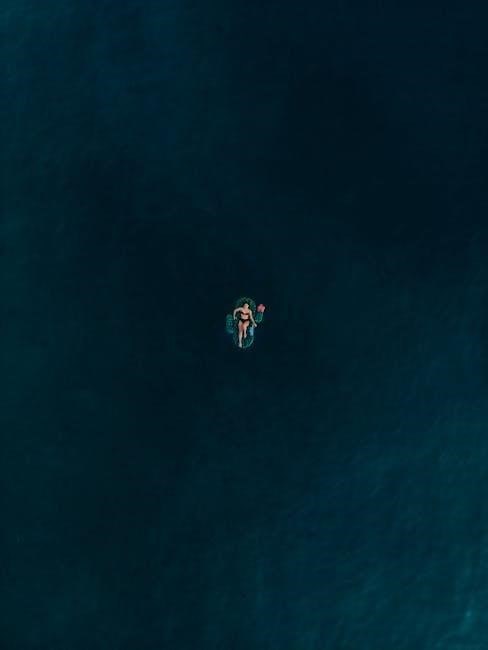Daphne Kapsali’s 100 Days of Solitude is a transformative journey of self-discovery, offering poignant reflections on solitude’s power to foster personal growth and creativity in a busy world.
Overview of the Book
100 Days of Solitude by Daphne Kapsali is a captivating collection of 100 interconnected stories that explore the transformative power of solitude. Written during her isolated sojourn on a remote Greek island, the book delves into themes of self-discovery, creativity, and the importance of reclaiming time for oneself. Each story reflects Kapsali’s journey of introspection, offering insights into how solitude can foster personal growth and artistic expression. The book is not just a memoir but a guide, urging readers to embrace quietude in a world dominated by noise and connectivity. With its poignant reflections and inspiring narrative, 100 Days of Solitude challenges readers to rethink their relationship with solitude and discover its profound benefits. It is a testament to the idea that true fulfillment often emerges from moments of stillness and self-reflection.
Significance of Solitude in Modern Life
In a world dominated by constant connectivity and noise, the concept of solitude has become a rare and valuable commodity. Daphne Kapsali’s 100 Days of Solitude highlights the importance of embracing quietude as a means to reconnect with oneself and foster creativity. Solitude, in this context, is not about isolation but about intentional self-reflection and growth. In an era where digital distractions and societal pressures often overwhelm individuals, solitude offers a refuge for introspection and renewal. By prioritizing time alone, one can cultivate a deeper understanding of their true self, leading to greater fulfillment and purpose. Kapsali’s journey underscores the transformative power of solitude, reminding us that it is not a luxury but a necessity for living authentically in a fast-paced, hyper-connected world. Her work invites readers to reclaim solitude as a tool for personal and creative liberation.

The Author and Her Journey
Daphne Kapsali, a writer and self-described optimist, left her London life to spend 100 days on a Greek island, sparking her reflective and inspiring literary project.
Daphne Kapsali: Biography and Inspiration
Daphne Kapsali, a writer, reluctant yogi, and self-proclaimed pathological optimist, left her bustling life in London to embrace solitude on a remote Greek island in 2014. This transformative experience inspired her to write 100 Days of Solitude, a collection of 100 interconnected stories. Her journey was fueled by a desire to reconnect with herself and explore the depths of human existence. Kapsali’s work reflects her belief in the power of solitude to foster creativity, self-discovery, and personal growth. Her writing is deeply personal, offering readers a glimpse into her reflections on life, love, and the importance of living authentically. Through her book, she encourages others to embrace quietude and find meaning in stillness.

The Decision to Spend 100 Days in Solitude
Daphne Kapsali’s decision to spend 100 days in solitude was born out of a desire to escape the distractions of modern life and immerse herself in self-reflection. Leaving behind her bustling life in London, she retreated to a remote Greek island, seeking a space where she could focus on her writing and inner growth. This intentional isolation allowed her to explore the depths of solitude, creativity, and personal transformation. Her journey was not about escapism but about reconnecting with herself and understanding the value of stillness in a world that often prioritizes busyness. This 100-day experiment became the foundation for her book, offering readers a unique perspective on the power of solitude to reshape one’s life and perspective.

Key Themes in “100 Days of Solitude”
The book explores themes of self-discovery, creativity, and the importance of solitude in a fast-paced world, urging readers to embrace quietude for personal growth and authenticity.
- Self-discovery and personal growth through isolation.
- The power of solitude to spark creativity.
- Embracing quietude in a world that values busyness.
Self-Discovery and Personal Growth
Daphne Kapsali’s 100 Days of Solitude is a profound exploration of self-discovery and personal growth. By immersing herself in solitude on a remote Greek island, she reconnects with her inner self, free from the distractions of modern life. The book chronicles her journey through 100 separate yet interconnected stories, each revealing insights into the transformative power of silence and introspection. Kapsali’s experiences highlight how solitude fosters self-awareness, allowing her to confront her fears, desires, and aspirations. Through her reflections, readers are inspired to embrace solitude as a means to rediscover their true selves and cultivate a deeper understanding of life’s purpose. The book serves as a reminder that solitude is not isolation but a path to profound personal transformation and clarity.

The Power of Solitude in Creativity
Daphne Kapsali’s 100 Days of Solitude vividly illustrates the profound impact of solitude on creativity. During her 100-day retreat on a remote Greek island, Kapsali immersed herself in silence and isolation, which became the catalyst for her innovative writing. The absence of external distractions allowed her to tap into her inner world, fostering a deep sense of clarity and focus. Through solitude, she was able to channel her thoughts and emotions into a collection of 100 interconnected stories, each reflecting her unique perspective and artistic vision. This journey demonstrates how solitude can amplify creative potential, enabling individuals to explore new ideas and express themselves authentically. Kapsali’s experience serves as a testament to the transformative power of solitude in nurturing creativity and bringing imaginative concepts to life.
Embracing Quietude in a Busy World
Daphne Kapsali’s 100 Days of Solitude offers a compelling vision for embracing quietude in a world dominated by noise and constant connectivity. By immersing herself in solitude on a remote Greek island, Kapsali demonstrates how quietude can be a powerful tool for reconnecting with oneself and the world. Her journey is not an escape from reality but an intentional choice to carve out space for introspection and self-awareness. The book encourages readers to rethink their relationship with silence, showing how moments of stillness can foster clarity, creativity, and emotional balance. Kapsali’s philosophy of solitude is not about isolation but about finding harmony within oneself, making it a valuable guide for navigating the chaos of modern life. Her approach reminds us that quietude is a form of resilience, enabling us to live more authentically and meaningfully.
Comparisons with “One Hundred Years of Solitude”
While One Hundred Years of Solitude explores magical realism and a family saga, 100 Days of Solitude offers a contemporary reflection on solitude, self-discovery, and creativity.
Gabriel García Márquez’s Legacy
Gabriel García Márquez, the celebrated Colombian author of One Hundred Years of Solitude, left an indelible mark on world literature through his magical realism. His ability to weave the fantastical with the mundane redefined storytelling, capturing the essence of Colombian culture and history. Márquez’s work transcends time, offering timeless insights into human experiences through vivid, enchanting narratives. His legacy lies in his unique storytelling style, which continues to inspire writers globally, including Daphne Kapsali, whose 100 Days of Solitude reflects on solitude and self-discovery in a contemporary context. Márquez’s influence remains profound, as his works bridge the gap between reality and fantasy, leaving readers with a deeper understanding of life’s complexities.
Magic Realism vs. Contemporary Reflections
Magic realism, pioneered by Gabriel García Márquez in One Hundred Years of Solitude, blends the fantastical with the ordinary, creating a unique narrative style. In contrast, Daphne Kapsali’s 100 Days of Solitude offers a contemporary reflection on isolation, focusing on personal growth and self-discovery. While Márquez’s work immerses readers in a world of enchantment and tragedy, Kapsali’s approach is deeply introspective, exploring the human condition through solitude. Both works, though distinct in style, share a common thread—examining the complexities of existence. Márquez’s magical realism transports readers to another world, whereas Kapsali’s reflections ground them in the present, highlighting the universal relevance of solitude across time and genres.

The First Days of Solitude
Daphne Kapsali’s initial days in solitude were marked by a profound shift from constant connectivity to quiet isolation, bringing both excitement and challenges as she embraced her new routine.
Adjusting to a New Routine
Daphne Kapsali’s transition to solitude began with a significant shift in her daily life, moving from the bustling streets of London to a secluded Greek island. The initial days were filled with the challenge of adapting to a new rhythm, devoid of the constant distractions and social interactions she once knew. She embraced the quiet, focusing on writing and introspection, but the absence of familiar routines initially felt unsettling. The stillness of her surroundings forced her to confront her thoughts and emotions head-on, a process that was both liberating and intimidating. This period of adjustment laid the foundation for her journey, as she slowly began to find comfort in the simplicity and solitude of her new environment.
Initial Challenges and Excitement
Daphne Kapsali’s first days of solitude were marked by a mix of excitement and challenges as she transitioned to a life of isolation. The sudden absence of urban distractions and social interactions brought both thrill and discomfort. She found herself grappling with the unfamiliar silence, where every thought and emotion became magnified. The initial excitement of embarking on this transformative journey was tempered by moments of loneliness and self-doubt. Yet, she embraced the opportunity to reconnect with her inner self, using writing as a tool to process her experiences. The early days were a balancing act between the novelty of solitude and the discomfort of letting go of familiar routines, setting the stage for profound personal insights and growth.

The Transformative Journey
Daphne Kapsali’s 100 Days of Solitude unfolds as a deeply reflective journey, blending 100 interconnected stories that explore self-discovery, creativity, and the profound shift in perspective solitude brings.
Midway Reflections and Insights
By the midpoint of her 100-day journey, Daphne Kapsali experienced profound insights into the human spirit, revealing how solitude fosters self-awareness and creativity. The initial excitement of isolation gradually gave way to a deeper understanding of her inner world. She reflected on the societal pressures she had previously endured, realizing how they had stifled her true potential. The quiet moments allowed her to reconnect with her passions and desires, sparking a renewed sense of purpose. Kapsali’s midway reflections highlight the transformative power of solitude, as she began to see it not as an absence of connection but as a profound opportunity for introspection and growth. These insights became the cornerstone of her book, offering readers a roadmap to embracing quietude in their own lives.
The Role of Nature and Isolation
Nature and isolation played pivotal roles in Daphne Kapsali’s transformative journey. The serene Greek island setting provided a backdrop of tranquility, allowing her to immerse herself in solitude. The absence of urban distractions enabled her to reconnect with the natural world, fostering a sense of harmony and balance. Isolation allowed her to step away from societal expectations, embracing a simpler way of life. Through her experiences, Kapsali illustrates how nature and solitude can serve as catalysts for personal growth, offering moments of clarity and introspection. Her reflections emphasize the importance of disconnecting from the world to reconnect with oneself, highlighting the restorative power of both nature and isolation in fostering creativity and self-discovery.
100 Days of Solitude offers profound lessons on embracing quietude and self-discovery. Daphne Kapsali’s journey highlights solitude’s transformative power, encouraging readers to seek stillness for creativity and growth.

The Last Days and Lessons Learned
As Daphne Kapsali approached the end of her 100-day solitude, she reflected on the profound transformations she experienced; The final days brought a mix of relief and nostalgia, as she prepared to reenter a world she had momentarily escaped. Her journey taught her the value of stillness and the importance of creating space for self-reflection. She realized that solitude is not an escape but a catalyst for growth, allowing her to reconnect with her true self. The lessons she learned—about resilience, creativity, and the beauty of quietude—became the foundation of her newfound perspective on life. Her experience underscored the idea that solitude, when embraced, can lead to profound personal evolution and a deeper understanding of one’s place in the world.
Applying the Concept of Solitude in Daily Life
Daphne Kapsali’s experience highlights the importance of incorporating solitude into daily life, even in small doses. By embracing moments of quiet reflection, individuals can foster creativity, clarity, and emotional balance. Solitude doesn’t require complete isolation but involves intentional pauses from the world. Simple practices like mindfulness, journaling, or spending time in nature can help individuals reconnect with themselves. Kapsali’s journey shows that solitude is not an escape but a tool for renewal. By prioritizing alone time, people can cultivate resilience, self-awareness, and a deeper appreciation for life’s simplicity. This mindful approach to solitude encourages personal growth and well-being, proving that even brief moments of stillness can have a profound impact on one’s life.